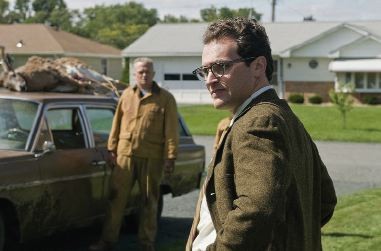A Serious Man

It’s 1967 in Minnesota, and life is getting more and more difficult for physics professor Larry Gopnik (Michael Stuhlbarg). Despite his best efforts to be a good man, a respected member of his Jewish community, a bona fide mensch, the structure of his life is collapsing like the walls of Jericho.
Larry’s son, Danny (Aaron Wolff), is a Hebrew school screwup with a strong taste for pot. His daughter, Sarah (Jessica McManus), is looking to escape her heritage by getting a nose job. His brother, Arthur (Richard Kind), a once brilliant mathematician, is slowly going mad. He sleeps on Larry’s couch and monopolizes the lone bathroom to drain the pus from his infected boils. And Larry’s goyish next-door neighbor, a right-wing deer hunter, is looking to build a cleaning shed for animal carcasses on Larry’s land.
But the biggest brick falls when Larry’s wife, Judith (Sari Lennick), an nounces that she wants a divorce. She has fallen in love with a wealthy widower, Sy Ableman (Fred Melamed), who in Judith’s eyes possesses the gravitas that Larry lacks.
A Serious Man, the latest effort by the talented and prolific brothers Joel and Ethan Coen, finds them returning to what they do best: addressing questions of human behavior and individual morality in a chaotic world. Like their hilarious Raising Arizona, the story of an ex-con and ex-cop couple who kidnap one of five infant quintuplets, A Serious Man uses a well-defined cinematic frame work to wrestle with questions of manhood, virtue and desire.
Here, that framework is a small piece of the American Jewish experience. The film begins with a Yiddish language prologue set in a 19th-century shtetl. An angry woman uses an ice pick to stab a dybbuk, the evil spirit of a dead man, only to discover that she may have stabbed an old rabbi instead. Will this act curse her and her family for all eternity? Or will God perhaps wait a hundred years and deliver the blow in the suburbs of Minneapolis?
A Serious Man deals not only with Larry’s uncanny string of bad luck but also with his efforts to come to terms with this Job-like existence. He has several meetings with rabbis, which the Coens cleverly separate under three chapter headings. These meetings run the gamut from the ridiculously optimistic, in which a young rabbi paints life as a parking lot with different cars moving in and out all the time, to the stoic and mystical, embodied by the elderly Rabbi Marshak, who no longer has the time to see anyone or dole out any life-affirming wisdom. (“The rabbi is busy.” “He doesn’t look busy!” “He’s thinking.”)
The Coens don’t hesitate to sprinkle a bit of wisdom throughout. Even as we are rooting for Larry to take control of his life and attain his goal of becoming a serious man, God is deciding that this may be a good time to start moving in his patented mysterious ways. Are Larry’s many dreams and nightmares signs from above? Does his son’s ability to make it through his bar mitzvah stoned augur well for the future? Will Sy Ableman see the error of his ways? Will Arthur find peace and serenity at a gambling parlor? And will Larry’s daughter decide that her nose is perfect just the way it is?
Or will Larry slip up, just once, just a bit—but enough for a suddenly vengeful God to remember that bleeding rabbi in the shtetl?




